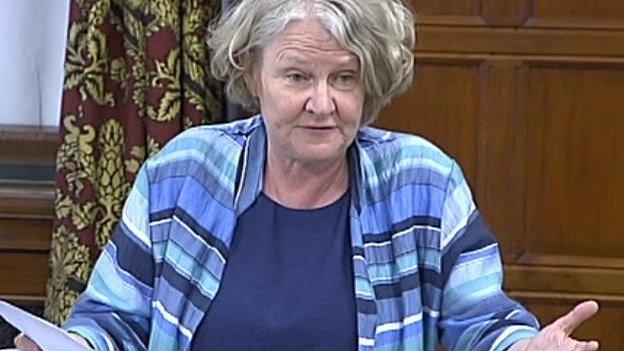Liz Kendall: I'm an 'all or nothing' person
- Published
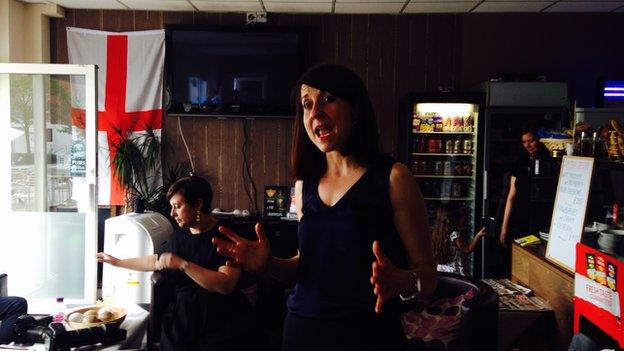
Liz Kendall admits she is the outsider in the four-way contest
In the first of a series of profiles of the four Labour leadership candidates, the BBC's Iain Watson spends the day with Liz Kendall on the campaign trail in Berkshire.
She has never been on a CND demonstration. But in her youth, before joining Labour, Liz Kendall first took to the streets to campaign for a pedestrian crossing in Abbott's Langley, her Hertfordshire village... with her mum.
Could there be a better image for a candidate who aims to win back Middle England marginals? She did succeed in getting that crossing. "We Kendalls always succeed," she says as she recounts the tale on the train to Reading, a town where Labour took both seats in 1997 but failed to win either of them back in 2015.
She also tells me she was at the same school - Watford Grammar - as Spice Girl Geri Halliwell, and that if Girl Power is to be put into practice, it's high time Labour had a woman leader.
But why not Yvette Cooper - a more experienced politician? "We need someone who can lead the party in to the future, who will meet challenges head on. You don't solve the problem of our defeat by trying to paper over it, you face it, deal with it. Change. That's what I've got to offer."
The 44-year old MPs has never been in the cabinet, and so she feels she has less baggage than both Yvette Cooper and Andy Burnham, and more free to tell home truths.
Dancing shoes
That may be a trait she inherited from her mother, a primary school teacher.
Liz Kendall loved dancing as a child and took part in public performances. But her mum told her bluntly she wasn't good enough to be a professional. "I wasn't very happy with her at the time," she admitted.
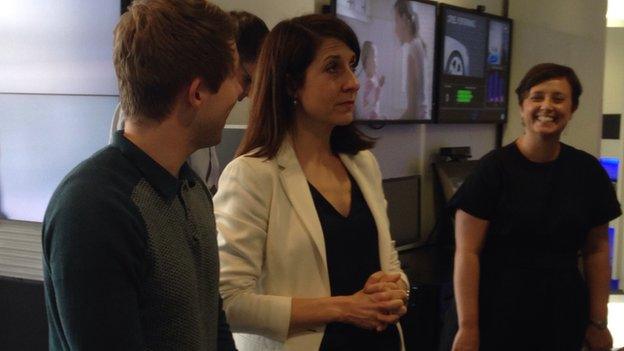
Liz Kendall says she is standing to hammer home the message that Labour needs to change
She is now the one telling her party "uncomfortable things" that some of them don't want to hear - primarily, reminding them just how badly they lost.
She joined Labour when at Cambridge University, just after Labour's arguably unexpected defeat in 1992.
And in delivering her home truths, she doesn't just have a warning for those who have joined the party after its latest defeat in order to vote for left-winger Jeremy Corbyn.
She also takes a pop at the more mainstream shadow cabinet duo of Andy Burnham and Yvette Cooper too.
"If we move to the far-left it will be disastrous - we will be out of power for a long time. But if essentially we also just say and do the same things as we did over the past five years we will end up with the same result. Someone who just has a different gender, or a different accent (from Ed Miliband) just isn't enough."
'Straight answer'
But why did she stand for the leadership? "I gave a straight answer to a question. Andrew Neil on the BBC asked me if I was going to go for it and I said yes."
And from one television celebrity to another. The comedian Arthur Smith has done a fundraiser for her, but she had to do a stand-up act of her own in front of the still shell-shocked Labour members she met in a cafe - a forum which the losing candidate for Reading West, Vicky Groulef, had organised.
She opens her performance for party members with a bombshell: "They are out to obliterate us."
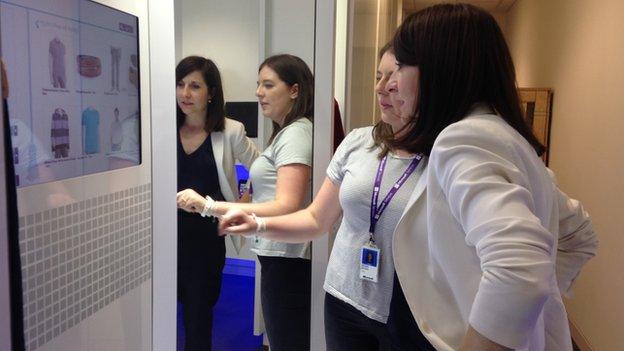
Labour needs to come to terms with the challenge and opportunities presented by globalisation, Liz Kendall says
No, not her leadership rivals but the Conservatives - stealing Labour's clothes on the living wage, and attacking the party's funding by reforming trade union laws.
She much prefers this format to the series of gruelling hustings all the candidates have to attend in every region of the country.
"At those meetings we are often asked about council house building or spending cuts when the fundamental question is what this party is for in the twenty first century. And it's difficult to convey that in a series of one-minute answers."
So here she's on her feet for over an hour, fielding questions from some activists who haven't pledged support for her.
She hears members complain about the former leader - "we followed a firm tradition of having the wrong person", one says - and she pledges that she wouldn't oppose a "break clause" in her leadership so she could be removed if she doesn't live up to expectations.
'Rocking the boat'
But this is about politics, not just personality, and she is told that Labour didn't have a message that resonated in this comfortable, but not affluent, area: "We had nothing to say to people who were coping with their mortgage payments, just about doing ok, and didn't want us to rock the boat."
She repeats her core message that Labour must again be seen as the party of work, not welfare. Even her poorly paid hairdresser had voted Tory because she didn't think Labour stood up for people that want to get on.
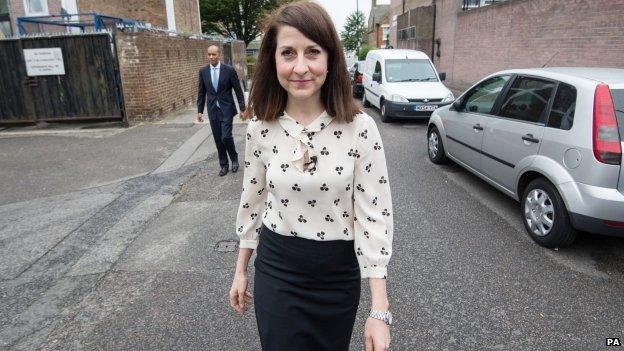
Liz Kendall's first political foray was to campaign for a pedestrian crossing in her village
Members of her own family had voted Conservative, she confided - though not her dad Richard - a former Liberal councillor who has returned to the Labour fold from which he had bolted in the seventies.
Fundamentally, she said, Labour had to be trusted again on the economy - and argued that being fiscally prudent wasn't always regarded as right-wing.
Adorning the largest wall in the cafe was the flag of St George and the Leicester West MP - who represents a multi-cultural seat - said she was being told on the doorsteps her party must speak for England. She favours setting up an English Labour Party, on a par with the Scottish and Welsh parties with their own leaders.
"It's important to give England a greater voice," she tells me. "We believe in the Union but you have to look at giving English MPs more of a say in parliament. But this isn't just about obsessing over who sits on what committees (at Westminster) - it's also about getting more powers out of Whitehall."
But how can Scotland be won back for Labour? Indeed can Scotland be won back?
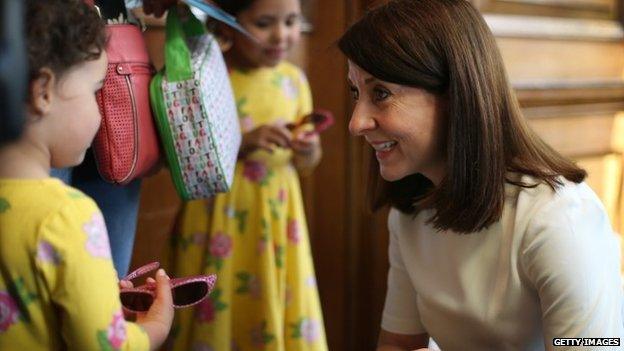
Before entering Parliament, Liz Kendall campaigned for statutory paternity and maternity leave
"I don't want to give glib answers. But the problem started before the referendum. We took too many people for granted. Our brightest and best there chose to come to Westminster. If you lose touch with your roots you get this result. But we must have a positive, optimistic vision of Scotland's future. There are no easy solutions but we have got to work more as a team with the new leader in Scotland (who will be elected in August)."
Apart from meeting party members, Liz Kendall squeezes in two more visits to highlight the themes of her campaign.
The Little Kingdom nursery in Reading is innovative in two ways, it charges by the hour, not the day, to help parents on zero hours contracts. And it trains up its own staff.
She declares that she wants the state to get out of career advice, at which it's not terribly good, and let businesses fill the gap.
She wants to see better, more flexible child care provision too. Before becoming an MP she ran the Maternity Alliance charity, between stints as a government adviser - first to Harriet Harman on welfare, then Patricia Hewitt at the Department for Business.
Family ties
She isn't embarrassed by her background as a special adviser.
"I am very proud to have worked with Harriet in the 1997 campaign and on the national childcare strategy. When she was sacked from the cabinet it was a very bruising experience but she got us all together and said we would go on to achieve great things.
"I campaigned for rights to flexible working and Patricia said 'come in and make it happen on maternity and paternity leave'."
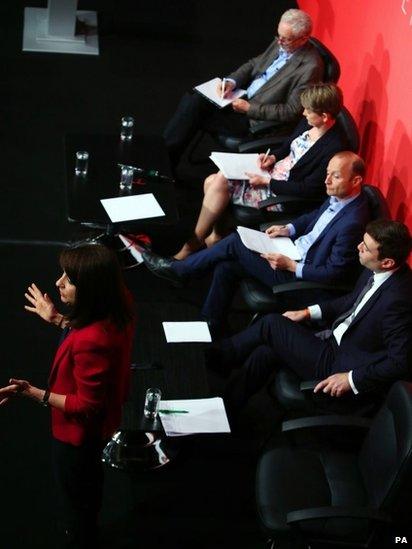
The candidates have been speaking at hustings across the country
Given her long-standing commitment to childcare I wondered if she had been hurt by supporters of rival candidates pointing to the fact that she doesn't have children of her own?
"I am close to my nieces," she replies.
Yes, but why does the issue even matter? Why is it raised at all?
"Well, I had this from journalists way before this leadership campaign. I don't think they would ask the same questions of men. A woman said to me 'you don't have a family' but I do have a family - they come in different shapes and sizes and I am passionate about giving children the best start in life."
So much for the rough and tumble of the leadership campaign. She admits it has become more divisive but doesn't think that is entirely a bad thing.
'Debate then unite'
In 2010 the party perhaps papered over some big cracks in the interest of unity. "You must debate, decide, then unite in that order," she says.
But what of the former Blairite ministers - and there are a few - who like her politics but either don't think she is leadership material or couldn't unite the party even when the debate subsides?
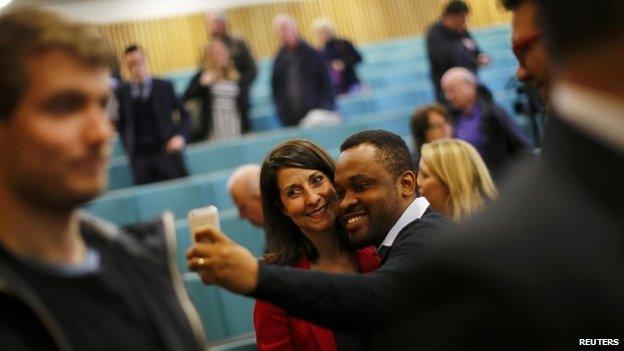
The new leader will be announced on 12 September
"Leaders don't shy away from things that are difficult. And a good leader builds a strong team and sets out a clear direction of travel.
"Look, I'm the outsider. I haven't been a cabinet minister. But I feel I haven't got any choice but to stand. I can't bear to see my party lose again and be out of power for a generation. I'm an all or nothing person - that's why I am doing this. We have to make sure we are in touch with the country as it is - not as we wish it to be."
But would she be as radical as she first appears? The rhetoric on change is strong. What about the practicalities?
She says she is pro-business. She says she wants to see a step change in devolution to English town and cities. Surely then she couldn't possibly object to the government's proposal to giving councils and mayors the right decide Sunday shopping hours? Well, apparently she can.
"I think the Sunday trading laws give people time to spend with their families. And there is enough time for businesses to sell their goods."
So how radical would her devolution be to English cities? "We need a new fiscal settlement for local government," she says.
Would they be given tax raising powers? The power to set business rates?
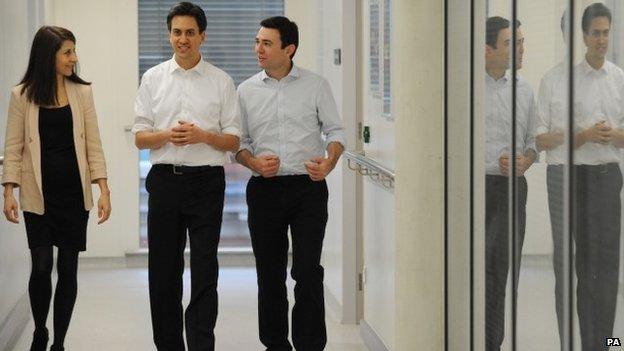
Liz Kendall says Labour cannot continue with the policies pursued by Ed Miliband
"At this stage in the leadership election, I want to set out a direction of travel. The country - and the party for that matter - is too centralised. It would include more power and responsibility over business rates. But we have got to get the balance right. If you devolve everything some of the most deprived areas won't get the resources and help they need."
As someone who has championed public service reform, would she back Conservative plans for a threshold of support before employees in essential services could go on strike?
"No, I don't support those plans. Look, many MPs are elected on a low threshold. The way to stop strikes is through negotiation. There is a big role for unions in the future - but they, like we, have to change. Look at the Community trade union - they are becoming the trade union for the self employed. Those huge workplaces, where we had a sense of solidarity, many of them are gone."
As it happens, the leadership of the Community union is backing Yvette Cooper.
Labour's splits on strategy, as much as substance, were highlighted recently when the interim leader Harriet Harman called for her party to abstain on the Welfare Bill but 48 of her MPs rebelled.
Welfare stance
Not Liz Kendall, though. So when the bill returns in the autumn would she back the Conservative policy of restricting child tax credit to two children for future recipients?
"The reason I strongly defended Harriet is she was trying to say if we oppose all of the bills, as we did in the last parliament, we will get the same result. If we are going to oppose something we have to show how we would pay for an alternative.
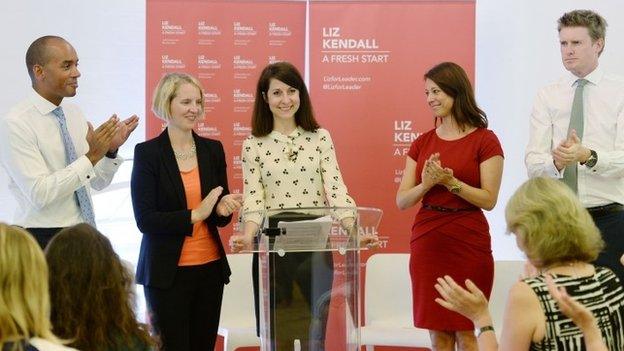
Liz Kendall has the support of prominent Blairites but critics question whether she has wider appeal
"So on tax credits, I say to govern is to choose - we spend £100bn on tax reliefs, many of which are good, but I have asked Margaret Hodge (the former chair of the Public Accounts Committee) to do a big review of those reliefs to come up with the money we need."
On the specific question, after a protracted exchange, I never did get a Yes or No answer but given the strength of feeling in the Parliamentary Labour Party I get the impression she would like to find an alternative proposal rather than back this specific Conservative plan.
After all, she has said she backs the benefit cap in principle but doesn't use the same language on the future tax credit restrictions.
I conclude by asking "so you might vote for the Conservative proposal" and she responds: "As leader I won't oppose anything unless we show how we can pay for the alternative. That is it, full stop. That would be a general rule under my leadership."
A trip to Microsoft - located on the outskirts of Reading due to proximity to Heathrow - allows Liz Kendall to underline her support for a third runway at the airport.
She also meets two very bright apprentices and portrays herself as the candidate of the future as she is shown cutting edge technology to enable 'virtual meetings' to take place - and an electronic changing room where clothes can be called up on screen and delivered to the door (or curtain).
Chelsea Girl
She utilises this as an opportunity to burnish her pre-special adviser working-life credentials by admitting she had a Saturday job in Chelsea Girl - or "the forerunner of River Island", as she explains to younger Microsoft staff.
Then it's back on message - but she delivers her pitch with passion: "The world of work is changing. We live in a global economy. This is what we must debate in the Labour Party. How do we show our principles are relevant in the modern world?
The candidate characterised as the most Blairite says New Labour was too cavalier about the consequences of globalisation and didn't do enough for those who were left behind: "The great tragedy is our values and principles - achieving more through common endeavour than we do alone - are more relevant than ever and yet we have vacated the ground."
She has big plans if elected, including a major speech on foreign policy.
But her summer will be spent travelling the town and cities of England trying to convince Labour members that the party needs to change quite as much as she believes it must.
"Just being a bit more pro-business won't cut the mustard," she concludes.
Then it was off to Ealing in west London, where Labour won a seat from the Conservatives, for a fundraiser.
On 12 September when all the votes are counted, her adage "the Kendalls always succeed" will be put to the test. Until then perhaps her old Watford Girls grammar school motto will stand her in good stead: "Go forward - with preparation."
- Published25 July 2015
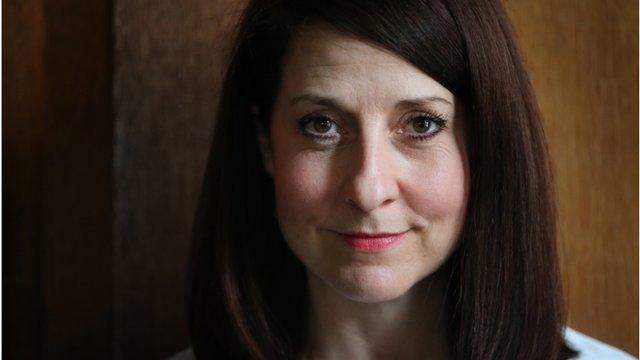
- Published23 July 2015
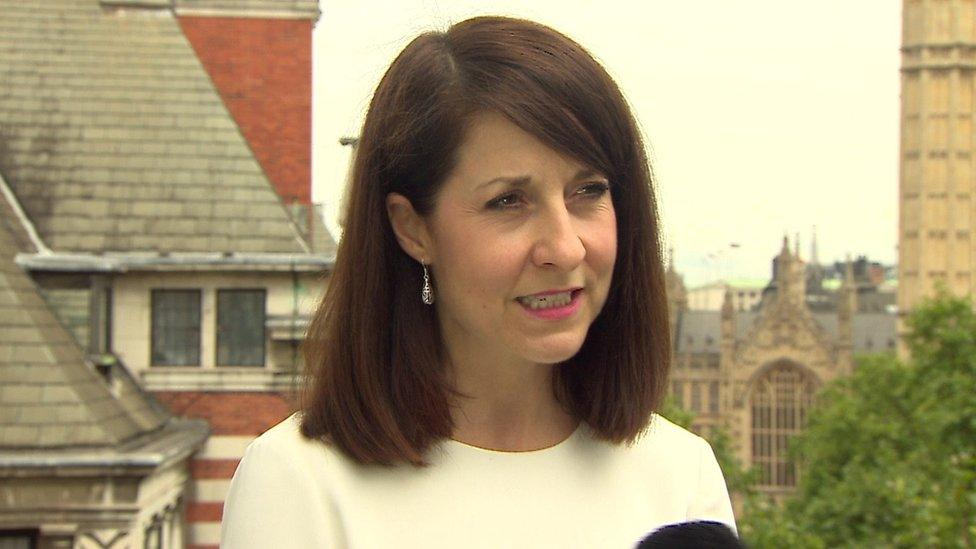
- Published7 July 2015
